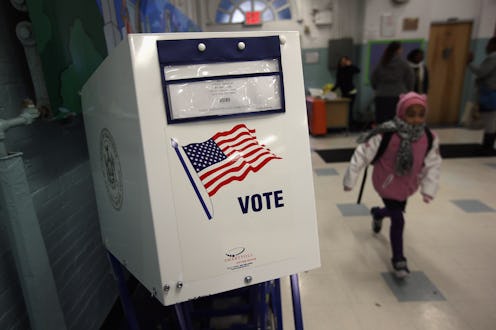News
Arizona's Special Election Is Peak #MeToo & You Need To Know About It

After a congressman resigned in disgrace amid sexual harassment allegations, voters in the Copper State will head to the polls on Tuesday to cast a ballot in Arizona's special election. The circumstances surrounding former Rep. Trent Franks' December resignation were already unusual, but the election to fill his seat strays from the norm as well. Two women are vying to replace the accused sexual harasser in Congress in an election unique to the #MeToo era of politics.
Either Democratic candidate Hiral Tipirneni or Republican candidate Debbie Lesko will be elected to take Franks' seat in Washington. Lesko is expected to win the seat, CNN reports, as Donald Trump won Arizona's 8th District by a double-digit margin in 2016. But regardless of who wins, a woman will be replacing Franks on Capitol Hill.
As you may recall, Franks abruptly resigned after the House Ethics Committee launched an investigation into his behavior last year. The move came in response to allegations that Franks sexually harassed two of his female staffers by discussing surrogacy. "I deeply regret that my discussion of this option and process in the workplace caused distress," Franks said in a December statement. He officially left office on Jan. 31.
Multiple seats in Congress have opened up in recent months as men accused of sexual harassment have left Capitol Hill — and women are stepping up to fill them. Sen. Tina Smith was sworn into office in January following former Sen. Al Franken’s resignation amid multiple allegations of sexual misconduct.
Unlike Smith, who was appointed by Minnesota’s governor, Tipirneni and Lesko had to face off in a special election. The two women’s campaigns were polar opposites: Tipirneni ran on a progressive platform aimed at protecting immigrants and women’s right to choose, while Lesko supported President Trump’s border wall and described herself as pro-life.
The very issue that launched the special election also created clear distinctions between the two candidates. Lesko backtracked on previous statements that Trump should be investigated for alleged sexual harassment, telling The New York Times last month: "I didn’t mean a formal investigation by government or something like that — I just meant it needs to run its course."
She also accepted a $2,700 donation from Franks, the maximum amount allowed in a general election, The Arizona Republic reports.
Her opponent, Tipirneni, has consistently called for Congress to strengthen laws prohibiting sexual harassment and asserted that Lesko should return the money her campaign accepted from Franks. "Franks mistreated the women on his staff, and his money is not welcome!" Tipirneni tweeted earlier this month.
Tipirneni only faced one Democratic challenger in the February primary — who also happened to be a woman — while Lesko beat out a whopping 11 male primary challengers, including a minister involved in a sexting scandal.
Even though Tipirneni is expected to lose in the GOP-controlled district, a close race would give Democrats a more optimistic outlook on the November midterm elections. Similar to the Pennsylvania special election earlier this year that was initially too close to call, a Democrat even getting close to beating a Republican in a historically Republican district gives Democrats better odds of flipping red districts in November.
And although neither candidate has taken a strong stand against sexual harassment, the all-female congressional race signals a shift in American politics brought on in part by the #MeToo movement. The record number of women running for office in 2018 is expected to shake up ballots across the country in November, so Arizona's special election could serve as a preview of what's to come. Either Tipirneni or Lesko will soon supersede an accused sexual harasser, shifting the gender imbalance in Washington a littler closer to parity.